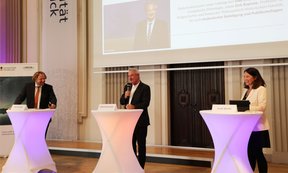The EU’s motto is “United in Diversity” which suggests a commitment to and competence in dealing with plurality. At the same, as we can see that the EU is struggling with exactly those issues of diversity, with conflicts about migration and, recently, with constitutionality, like in the case of Poland. While Asselborn stated that times were indeed difficult and that there had been many setbacks in the history of the European Union, the EU is still an outstanding project of integrative politics and peace. The EU is founded on values of democracy, freedom and diversity. EU decisions are based on discussion, which can take long time, but it is worth taking one’s time to listen in order to understand the other’s point of view. How can we achieve this on a political but also an everyday level? How can we involve people and address them as EU citizens? In Asselborn’s view, the EU needs to become a more participative project in the future in order to provide and foster identification and acceptance: “The EU will only survive with the values of democracy, if the values of democracy will no longer be accepted, this will be the end of Europe as we have known it for over 50 years now.”
Has Europe really grown together over that time? Crises like Covid-19 pandemic might indicate the opposite when national borders were closed. This should never be the case again, says Asselborn. We need solidary European solutions for the pandemic, for migration, for climate protection, for health management. “For we are more than governments working together, we are a union.”
Questions from the audience addressed the geographical history and future of the EU: in which direction should the EU grow, towards the East up to the Ukraine or towards the South in order to include North African countries in the Mediterranean? Could this be a global contribution to stabilize the world beyond the European borders? Further questions addressed the need for supranational institutions and social mobility along with physical mobility: How can programmes of exchange be socially inclusive when students face economic difficulties?
This topic links this session with Minister Asselborn back to the question at the heart of the lecture series: Inequality as well as diversity are complex and need to be addressed from an intersectional perspective. And we need to bring together perspectives from research, policy-making and politics for a balanced debate on how to ‘do diversity’.
(Silke Meyer)

